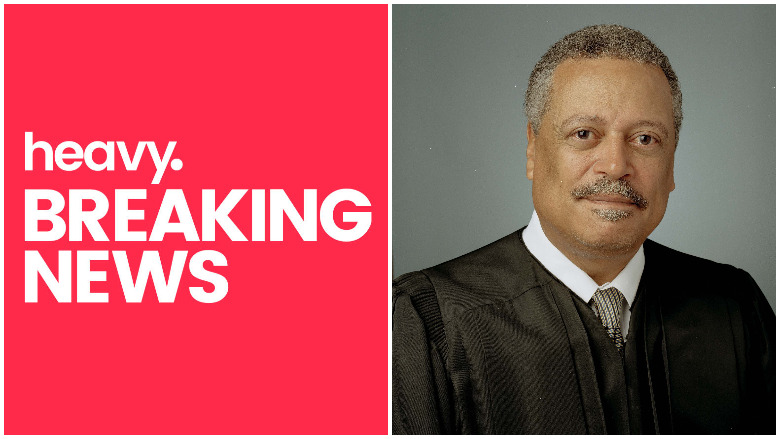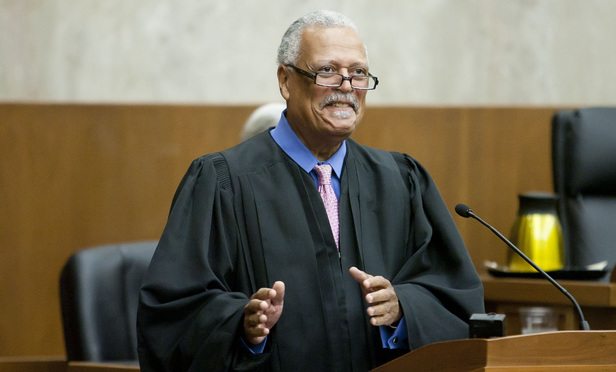
Emmet Sullivan, the federal judge presiding over the Michael Flynn sentencing, has raised concerns in a political prosecution before about the behavior of government lawyers.
In fact, the judge tossed the conviction of a prominent Republican Senator after accusations of prosecutorial misconduct. On December 18, 2018, all eyes were on Judge Sullivan as Michael Flynn, the former National Security Adviser, appeared before him for his scheduled sentencing hearing.
On May 12, 2020, the judge caused controversy when he issued an order allowing friend of the court briefs in Flynn’s case. That move came after the U.S. Department of Justice moved to dismiss its case against Flynn, following the recommendation of U.S. Attorney Jeff Jensen. That came after the release of FBI agents’ notes that said things like “What is our goal — truth, admission or to get him to lie so we can prosecute him or get him fired?” The DOJ found that statements Flynn made to investigators weren’t material to a justified investigation.
Sullivan then took the unusual step of naming an outsider, a retired judge, John Gleeson, to examine the Flynn case, including whether Flynn might have committed perjury because of his guilty plea.
His full name is Emmet G. Sullivan, and he was born in 1947 in Washington, D.C. “Judge Emmet G. Sullivan was born in Washington, D.C., and attended public schools in the District of Columbia until his graduation from McKinley High School in 1964,” his judicial biography reads. “In 1968, he received a Bachelor of Arts Degree in Political Science from Howard University and, in 1971, a Juris Doctor Degree from the Howard University School of Law. Upon graduation from law school, Judge Sullivan was the recipient of a Reginald Heber Smith Fellowship.”
During Flynn’s sentencing on December 18, Sullivan appeared to question whether the charges against the retired Army lieutenant general and President Trump’s first national security adviser went far enough. Sullivan asked prosecutors whether treason had been considered as a charge, to which they said it had not, and the judge told Flynn, “arguably you sold your country out,” warning him he could send him to jail. Sullivan eventually allowed Flynn to delay the sentencing while he continues to cooperate with the government. A status hearing is now scheduled for March. Sentencing guidelines call for Flynn to receive from zero to six months in prison for lying to the FBI, and prosecutors agreed with the recommendation from Flynn’s attorneys that he serve no time behind bars.
Sullivan chastised Flynn one day after two of Flynn’s former business associates were indicted on federal charges accusing them of conspiring to cover up lobbying work they did for Turkey while working with Flynn’s company. Flynn was not charged in that case and cooperated with the government in relation to that investigation as part of his plea deal.
“All along, you were an unregistered agent of a foreign country while serving as the national security advisor to the president of the United States,” Sullivan told Flynn, according to NBC News. “That undermines everything this flag over here stands for. Arguably you sold your country out. I cannot assure you that if you proceed today, you will not receive a sentence of incarceration. This is a very serious offense. A high ranking senior official of the government making false statements to the Federal Bureau of Investigation while in the White House. Very serious crime. I’m not hiding my disgust, my disdain.”
“If you want to postpone this, and come back at some later point … that’s fine with me,” Sullivan told Flynn, according to CNBC. “I have to caution you that the sentence imposed today may not be the same sentence you would get after cooperation ends. The court likes to be in a position to say there is nothing else this defendant can to do help the United States of America.” Sullivan told lawyers from both sides that he has “many, many, many, more questions,” about the case.
Sullivan told the court, “I wasn’t suggesting he was committing treason. I was just curious if he could have been charged. Lots of conspiracy theories out there. Not taking any uncalled offenses into consideration. Was trying to consider benefit. I’m not suggesting treason.”
Here’s what you need to know:
1. Emmet G. Sullivan Is a Bill Clinton Appointee Who Was Previously Named to Judicial Positions By Two Republican Presidents
Emmet Sullivan has been named to judicial positions by three presidents: One, a Democrat, and two, Republicans.
Emmet Sullivan was named to the federal bench by former President Bill Clinton.
According to Ballotpedia, “Sullivan was nominated by President Bill Clinton to the United States District Court for the District of Columbia on March 22, 1994, to a seat vacated by Louis Oberdorfer.” Ballotpedia lists former Vice President Joe Biden, then a U.S. Senator, as being among Sullivan’s supporters at that time.
According to Judge Sullivan’s federal judicial bio, the judge was “confirmed by the Senate on June 15, 1994, and received commission on June 16, 1994.” He also served as a Judge, Superior Court of the District of Columbia, 1984-1992, and as a
Judge, District of Columbia Court of Appeals, 1992-1994.
However, Sullivan was also appointed to the bench previously by Ronald Reagan. “On October 3, 1984, Judge Sullivan was appointed by President Ronald Reagan to serve as an Associate Judge of the Superior Court of the District of Columbia,” his court bio reads.
“As an Associate Judge of the Superior Court, Judge Sullivan was one of only seven judges in the twenty-four year history of that court to have served full-time in every division. He served as the Deputy Presiding Judge and Presiding Judge of the Probate and Tax Divisions, as well as chairperson of the Rules Committee for those divisions.”
In addition, according to the bio, on November 25, 1991, Judge Sullivan “was appointed by President George H. W. Bush to serve as an Associate Judge of the District of Columbia Court of Appeals. While an Associate Judge of that court, and in addition to his full-time case management responsibilities, Judge Sullivan was Chairperson for the Nineteenth Annual Judicial Conference of the District of Columbia, which was held in 1994.”
2. Sullivan Tossed the Public Corruption Conviction Against Former Senator Ted Stevens
The Flynn matter is not the first hot potato political case that Sullivan has handled. In 2009, the judge expressed outrage at prosecutors’ handling of the corruption case against former Alaska Republican Sen. Ted Stevens. “In nearly 25 years on the bench,” Judge Sullivan said, according to Washington Lawyer, “I’ve never seen anything approaching the mishandling and misconduct that I’ve seen in this case.”
The concerns in the case revolved around the prosecutor not handing over exculpatory evidence to the defense. Stevens had been convicted of federal crimes for “failing to report thousands of dollars in gifts he received from friends,” Washington Lawyer reports. Sullivan threw out Stevens’ conviction, but it was at the request of then Attorney General Eric Holder. According to Washington Lawyer, there were allegations of prosecutorial misconduct, and the judge even asked a law firm to investigate the prosecution for possible criminal contempt.
In that case, a key witness had made statements helpful to Stevens but they were not initially disclosed to the defense. They were contained in FBI memos. Law Professor Jonathan Turley, told Washington Lawyer of Emmet G. Sullivan: “He is smart and courteous and even-keeled. To get Judge Sullivan that irate, it takes monumental misconduct.”
In 2017, Sullivan wrote an op-ed in The Wall Street Journal that was titled, “How New York Courts Are Keeping Prosecutors in Line. Evidence that supports the accused is supposed to be turned over to the defense. Ted Stevens would know.”
He raised concerns about prosecutors who “deliberately ignore” rulings that say they need to turn over potentially exculpatory evidence to the defense.
3. Sullivan Raised Questions About the FBI’s Handling of Flynn

Michael Flynn and his son, Michael G. Flynn arrive for a meeting at Trump Tower. (Getty)
Sullivan threw a potential wrench in the sentencing of Michael Flynn, the former U.S. National Security Adviser, who is accused of lying to federal investigators. The judge ordered prosecutors to turn over a memo that details the FBI’s interview with Flynn after Flynn’s lawyers said in a sentencing memorandum that investigators “discouraged him (Flynn) from bringing a lawyer to the White House interview,” according to Fox News. Flynn later pleaded guilty to lying to investigators about his contacts with the Russian ambassador, but some have criticized the FBI’s tactics.
You can read the redacted FBI memo in full here and above. It details agent Peter Strzok’s interview with Flynn. Strzok, of course, would later be removed from the Robert Mueller probe after texts came to light in which he and an FBI lawyer made disparaging remarks about President Donald Trump and Republicans.
4. Sullivan Ordered the Government to Turn a Plane Around in an Immigration Case
In August 2018, Sullivan made an unusual order in a case in which the Trump administration deported “an immigrant mother and daughter who are plaintiffs in the lawsuit the judge was hearing over asylum restrictions,” according to NBC News.
The judge then ordered the government to turn the plane around and bring both plaintiffs back to the United States, NBC reported. If they didn’t, Sullivan said he might bring top officials – such as the Homeland Security Secretary and Attorney General – into court to answer to potential contempt of court accusations.
According to The National Law Journal, Sullivan has “criticized the lack of prosecutions against senior executives in white-collar crime cases.”
“No one goes to jail, no one is indicted, no individuals are mentioned as far as I can determine,” Sullivan said, according to the Law Journal. “There’s no personal responsibility.”
5. Sullivan, Who Graduated From Howard University, Criticized a General Motors Deferred Prosecution Agreement
The judge has expressed umbrage in other high-profile cases. He criticized federal prosecutors for entering into a deferred prosecution agreement with General Motors.
“In a shocking example of potentially culpable individuals not being criminally charged, the Department of Justice announced that it had entered into a Deferred-Prosecution Agreement with General Motors Company (GM) regarding its failure to disclose a safety defect,” Sullivan wrote.
Judge Sullivan has a bachelor’s degree from Howard University in 1968. That’s also where he received his law degree in 1971.
He also served as a Law clerk, for the Neighborhood Legal Services Program, Washington, D.C., 1971-1972, and for Hon. James Washington, Superior Court of the District of Columbia, 1972-1973. He was in private practice in Washington, D.C., from 1974-1984.
READ NEXT: See Photos of the Real Characters Behind Narcos: Mexico
